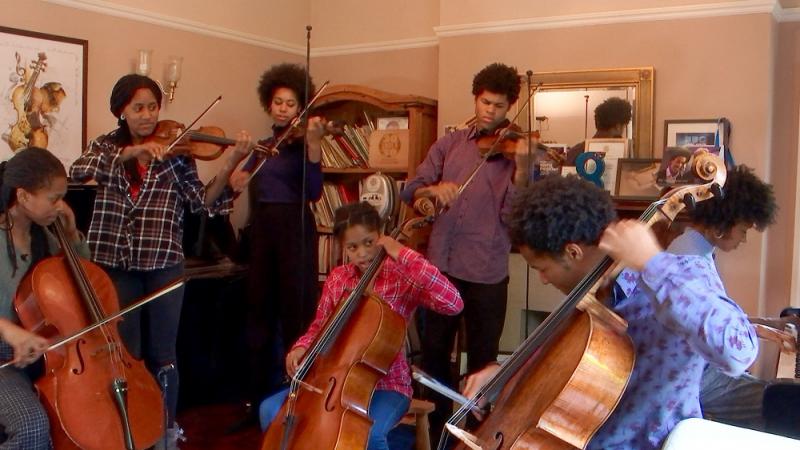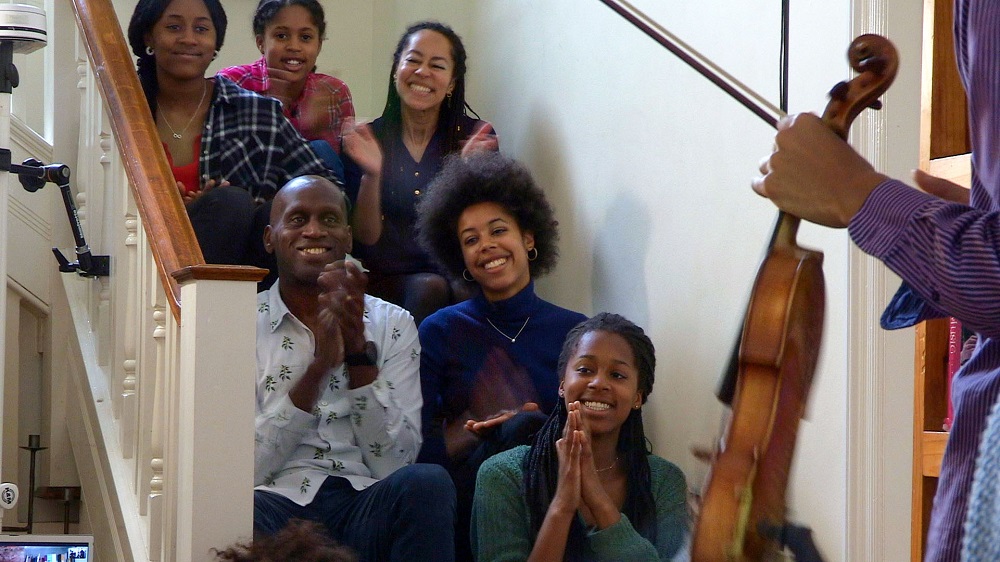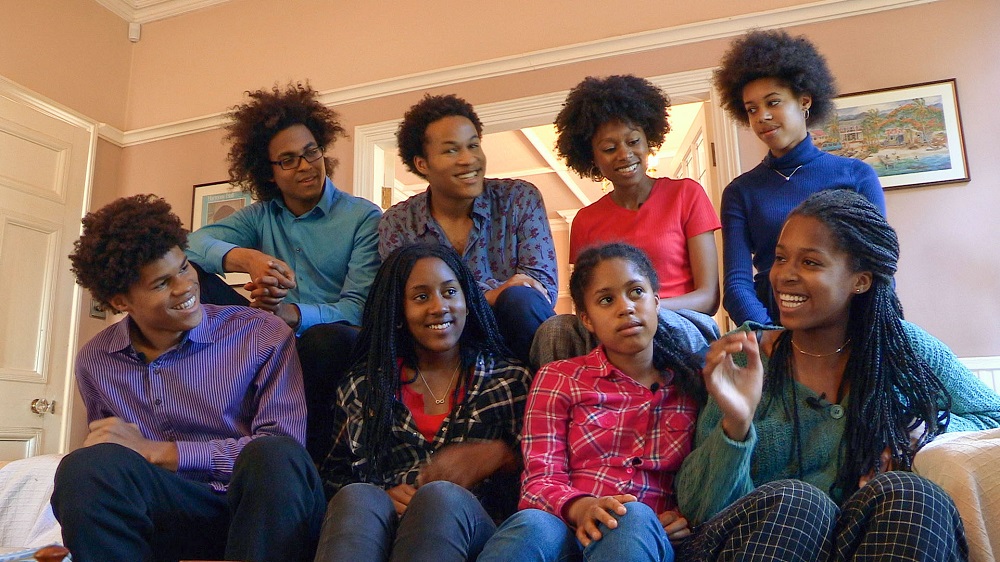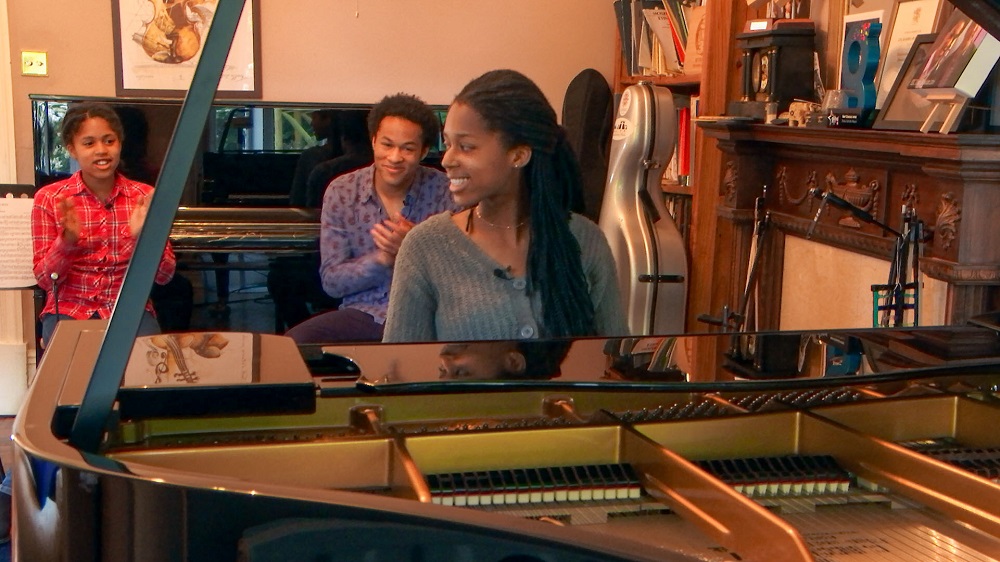This House is Full of Music, Imagine , BBC One review – a spring dream of a lockdown concert | reviews, news & interviews
This House is Full of Music, Imagine..., BBC One review – a spring dream of a lockdown concert
This House is Full of Music, Imagine..., BBC One review – a spring dream of a lockdown concert
Sheku Kanneh-Mason is only first among equals in this perfect home recital

No happy family, surely, was ever quite like this one. Love and mutual respect bound up with music-making at the highest level make the Kanneh-Masons of Nottingham a role-model for this country in times of trouble, with their reiterated message that music is for everyone, something to be shared at every level.
For once, the BBC has played its part in putting classical music centre-stage again. Having shunted BBC Young Musician of the Year off a prime spot on BBC One, it aired this showcase there at 6pm on Sunday evening. Some may find the spoken content minimal, the spelling-out of what music can do in terms of mental health, togetherness and hard work for a worthwhile goal obvious, but that’s the educational bit. Anyway, that’s not the point: if you want to learn more about this remarkable family, you need to watch the seminal Sheku-oriented documentary on the subject, Young, Gifted and Classical, which needs to be re-released and shown in every school.  The parameters are dictated instead by time in lockdown, and the camerawork is able to go one better on the little films the family put out using their mobile phones. Presumably with no operators present; I’d like to know how they did it. Alan Yentob is the predictable front man, Zooming the family to ask basic questions, but mostly non-irritant, though there’s one shot too many of him watching. Close-ups of the home audience, on the other hand, show the intent role of the spectator – an ideally supportive audience. Presentation could have held focus just on the performers, but the choice of director Dominic Best is to show the streets, parks and gardens all but empty in the glory of a pandemic spring, perhaps the most beautiful we’ve ever had.
The parameters are dictated instead by time in lockdown, and the camerawork is able to go one better on the little films the family put out using their mobile phones. Presumably with no operators present; I’d like to know how they did it. Alan Yentob is the predictable front man, Zooming the family to ask basic questions, but mostly non-irritant, though there’s one shot too many of him watching. Close-ups of the home audience, on the other hand, show the intent role of the spectator – an ideally supportive audience. Presentation could have held focus just on the performers, but the choice of director Dominic Best is to show the streets, parks and gardens all but empty in the glory of a pandemic spring, perhaps the most beautiful we’ve ever had.
Most remarkable of all, each piece is allowed to run its full course without interruption. For me, the revelation was a ravishing arrangement of “Scarborough Fair” for cello and guitar played in the garden by Sheku and a family friend welcomed to stay during the crisis, fellow student over some years Plinio Fernandes, who’s missing his family in stricken Brazil but with his sheer niceness clearly fits in with the Kanneh-Masons (Plinio first on the left in the back row pictured below). They could release a whole CD of such arrangements and I’d buy it.  We saw the astonishing assurance already of Mariatu, the youngest, on cello, playing Frank Bridge’s “Russian Waltz” in trio with sisters Aminatu on violin and Isata on piano; another trio gave us an arrangement of the spiritual “Deep River” by Samuel Coleridge-Taylor, a major inspiration among composers with roots in Sierra Leone, like the mother of the family, Kadiatu; dad Stuart – it was good to see more of him here than in the previous documentary – comes from Antigua, where the musicians have travelled, and presumably will again, to work in schools, with wonderful results. There was also a stylish nod from Sheku to Bob Marley, a happy influence in the Kanneh-Masons' wide-ranging musical education.
We saw the astonishing assurance already of Mariatu, the youngest, on cello, playing Frank Bridge’s “Russian Waltz” in trio with sisters Aminatu on violin and Isata on piano; another trio gave us an arrangement of the spiritual “Deep River” by Samuel Coleridge-Taylor, a major inspiration among composers with roots in Sierra Leone, like the mother of the family, Kadiatu; dad Stuart – it was good to see more of him here than in the previous documentary – comes from Antigua, where the musicians have travelled, and presumably will again, to work in schools, with wonderful results. There was also a stylish nod from Sheku to Bob Marley, a happy influence in the Kanneh-Masons' wide-ranging musical education.
The pianists of the family are consummate too, much assisted by the loan of three Bechsteins (pictured below: Jenaba wins applause from Mariatu and Sheku). Isata and Jenaba had set themselves the task of learning all the Chopin Études; Jenaba gave us the pure melody of Op. 10 No. 3, while Isata turned to the death-obsessed last of the Preludes, Op, 28 No. 24. And it’s not often on prime-time TV that you get to hear an entire piano piece by Bartók, albeit a racy one, the Allegretto from the Op. 14 Suite, wittily played by the engaging Konya.  Music-making in the street with a neighbour playing klezmer clarinet anticipated the perfect finale, all seven siblings in their own arrangement of a medley from Fiddler on the Roof, which they’d all seen – many times, it appears – as children; we caught a glimpse of Kadiatu wiping away a tear in “Sunrise, Sunset”. Adorable, all of them; why not a whole series of Sunday Night is Music Night with the Kanneh-Masons? Children of my generation dreamed of being a Von Trapp family member; now kids really can aspire to be as good as the Kanneh-Masons. In the midst of all the authoritarian horror and incompetence we’re trying to resist, this is England too.
Music-making in the street with a neighbour playing klezmer clarinet anticipated the perfect finale, all seven siblings in their own arrangement of a medley from Fiddler on the Roof, which they’d all seen – many times, it appears – as children; we caught a glimpse of Kadiatu wiping away a tear in “Sunrise, Sunset”. Adorable, all of them; why not a whole series of Sunday Night is Music Night with the Kanneh-Masons? Children of my generation dreamed of being a Von Trapp family member; now kids really can aspire to be as good as the Kanneh-Masons. In the midst of all the authoritarian horror and incompetence we’re trying to resist, this is England too.
- Available to watch for the next five months on the BBC iPlayer
- Sheku Kanneh-Mason plays Saint-Saëns's First Cello Concerto with the Philharmonia, released online on Thursday
- More classical reviews on theartsdesk
rating
Explore topics
Share this article
The future of Arts Journalism
You can stop theartsdesk.com closing!
We urgently need financing to survive. Our fundraising drive has thus far raised £49,000 but we need to reach £100,000 or we will be forced to close. Please contribute here: https://gofund.me/c3f6033d
And if you can forward this information to anyone who might assist, we’d be grateful.

Subscribe to theartsdesk.com
Thank you for continuing to read our work on theartsdesk.com. For unlimited access to every article in its entirety, including our archive of more than 15,000 pieces, we're asking for £5 per month or £40 per year. We feel it's a very good deal, and hope you do too.
To take a subscription now simply click here.
And if you're looking for that extra gift for a friend or family member, why not treat them to a theartsdesk.com gift subscription?
more Classical music
 Kanneh-Mason, Britten Sinfonia, Shave, Milton Court - a grin and a big beaming smile
A pair of striking contemporary pieces alongside two old favourites
Kanneh-Mason, Britten Sinfonia, Shave, Milton Court - a grin and a big beaming smile
A pair of striking contemporary pieces alongside two old favourites
 theartsdesk at the New Ross Piano Festival - Finghin Collins’ musical rainbow
From revelatory Bach played with astounding maturity by a 22 year old to four-hand jazz
theartsdesk at the New Ross Piano Festival - Finghin Collins’ musical rainbow
From revelatory Bach played with astounding maturity by a 22 year old to four-hand jazz
 First Person: Manchester Camerata's Head of Artistic Planning Clara Marshall Cawley on questioning the status quo
Five days of free events with all sorts of audiences around Manchester starts tomorrow
First Person: Manchester Camerata's Head of Artistic Planning Clara Marshall Cawley on questioning the status quo
Five days of free events with all sorts of audiences around Manchester starts tomorrow
 Goldscheider, Brother Tree Sound, Kings Place review - music of hope from a young composer
Unusual combination of horn, strings and electronics makes for some intriguing listening
Goldscheider, Brother Tree Sound, Kings Place review - music of hope from a young composer
Unusual combination of horn, strings and electronics makes for some intriguing listening
 theartsdesk Q&A: composer Donghoon Shin on his new concerto for pianist Seong-Jin Cho
Classical music makes its debut at London's K-Music Festival
theartsdesk Q&A: composer Donghoon Shin on his new concerto for pianist Seong-Jin Cho
Classical music makes its debut at London's K-Music Festival
 Helleur-Simcock, Hallé, Wong, Bridgewater Hall, Manchester review - moving lyricism in Elgar’s concerto
Season opener brings lyrical beauty, crisp confidence and a proper Romantic wallow
Helleur-Simcock, Hallé, Wong, Bridgewater Hall, Manchester review - moving lyricism in Elgar’s concerto
Season opener brings lyrical beauty, crisp confidence and a proper Romantic wallow
 Kohout, Spence, Braun, Manchester Camerata, Huth, RNCM, Manchester review - joy, insight, imagination and unanimity
Celebration of the past with stars of the future at the Royal Northern College
Kohout, Spence, Braun, Manchester Camerata, Huth, RNCM, Manchester review - joy, insight, imagination and unanimity
Celebration of the past with stars of the future at the Royal Northern College
 Jansen, LSO, Pappano, Barbican review - profound and bracing emotional workouts
Great soloist, conductor and orchestra take Britten and Shostakovich to the edge
Jansen, LSO, Pappano, Barbican review - profound and bracing emotional workouts
Great soloist, conductor and orchestra take Britten and Shostakovich to the edge
 Jakub Hrůša and Friends in Concert, Royal Opera review - fleshcreep in two uneven halves
Bartók kept short, and a sprawling Dvořák choral ballad done as well as it could be
Jakub Hrůša and Friends in Concert, Royal Opera review - fleshcreep in two uneven halves
Bartók kept short, and a sprawling Dvořák choral ballad done as well as it could be
 Hadelich, BBC Philharmonic, Storgårds, Bridgewater Hall, Manchester review - youth, fate and pain
Prokofiev in the hands of a fine violinist has surely never sounded better
Hadelich, BBC Philharmonic, Storgårds, Bridgewater Hall, Manchester review - youth, fate and pain
Prokofiev in the hands of a fine violinist has surely never sounded better
 Monteverdi Choir, ORR, Heras-Casado, St Martin-in-the-Fields review - flames of joy and sorrow
First-rate soloists, choir and orchestra unite in a blazing Mozart Requiem
Monteverdi Choir, ORR, Heras-Casado, St Martin-in-the-Fields review - flames of joy and sorrow
First-rate soloists, choir and orchestra unite in a blazing Mozart Requiem

Add comment